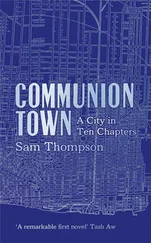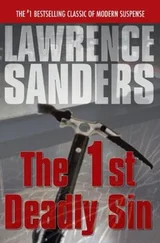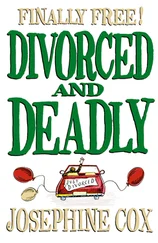Frank Tallis - Deadly Communion
Здесь есть возможность читать онлайн «Frank Tallis - Deadly Communion» весь текст электронной книги совершенно бесплатно (целиком полную версию без сокращений). В некоторых случаях можно слушать аудио, скачать через торрент в формате fb2 и присутствует краткое содержание. Жанр: Исторический детектив, на английском языке. Описание произведения, (предисловие) а так же отзывы посетителей доступны на портале библиотеки ЛибКат.
- Название:Deadly Communion
- Автор:
- Жанр:
- Год:неизвестен
- ISBN:нет данных
- Рейтинг книги:3 / 5. Голосов: 1
-
Избранное:Добавить в избранное
- Отзывы:
-
Ваша оценка:
- 60
- 1
- 2
- 3
- 4
- 5
Deadly Communion: краткое содержание, описание и аннотация
Предлагаем к чтению аннотацию, описание, краткое содержание или предисловие (зависит от того, что написал сам автор книги «Deadly Communion»). Если вы не нашли необходимую информацию о книге — напишите в комментариях, мы постараемся отыскать её.
Deadly Communion — читать онлайн бесплатно полную книгу (весь текст) целиком
Ниже представлен текст книги, разбитый по страницам. Система сохранения места последней прочитанной страницы, позволяет с удобством читать онлайн бесплатно книгу «Deadly Communion», без необходимости каждый раз заново искать на чём Вы остановились. Поставьте закладку, и сможете в любой момент перейти на страницу, на которой закончили чтение.
Интервал:
Закладка:
When Liebermann reached the ground he found himself in an alley separating two apartment blocks. Sprenger had interposed a distance of some twenty metres between them and was only a few strides from the exit and the streets beyond.
Another shot.
Sprenger veered off to the right and disappeared from view.
Liebermann heard Rheinhardt cursing. The expletive bounced off the opposite wall and sounded like the voice of an enraged god. Liebermann continued his pursuit, his feet pounding the cobbles until he was disgorged into a dilapidated backstreet. He caught sight of Sprenger, who was heading north towards the Danube canal. Sprenger’s punch had left a bolus of pain in Liebermann’s stomach. The young doctor was finding it more and more difficult to breathe, his chest ached and his limbs felt heavy.
The distance between them was widening.
Don’t give up …
Don’t give up …
This repeated exhortation created an insistent beat which he willed his legs to keep time with. It was like self-hypnosis. Liebermann became less aware of his surroundings and the world shrank, becoming nothing but the rhythm of his running, the pain in his gut, and Sprenger’s receding shirtsleeves.
They spilled out onto the busy thoroughfare of Franz-Josefs-Kai: people, carriages — the general hubbub of the Ring — the sound of a barrel organ and the smell of sausages on a brazier. Across the canal Liebermann could see the public baths. He persevered, pushing himself to the limits of endurance. Sprenger was eclipsed by some pedestrians and then appeared again, running in the road with the traffic. Liebermann’s spirits plummeted when he saw Sprenger getting on a tram. A bell sounded over the din, and Liebermann watched in despair as the vehicle moved away. He clenched his fist and shook it at the sky. Then he noticed something that made him start. There was a tram parked next to him, an ‘L’. Liebermann looked at Sprenger’s tram — also an ‘L’. He jumped on board and addressed the driver: ‘My name is Liebermann. I am an honorary agent of the security office. There is a dangerous and wanted man travelling on the tram ahead and by the authority invested in me by His Majesty the Emperor I command you to follow it.’
The driver was not convinced of Liebermann’s authenticity and, having previously observed him venting his frustration and anger at the clouds, said flatly: ‘Are you mad?’
‘Quite the contrary — I’m a psychiatrist.’ Liebermann removed one of his visiting cards from his coat pocket and flashed it in the driver’s face. ‘There! You see? Doctor Max Liebermann. Now, if you do not proceed this instant you must expect to find yourself before a magistrate tomorrow, explaining why you chose to obstruct the course of justice!’
Liebermann’s florid (and disingenuous) threat had the desired effect. The anxious-looking man rang the bell and the tram rolled forward.
‘Thank you,’ said Liebermann. There were now at least three carriages between Sprenger’s tram and his own. ‘Can’t you go any faster?’
‘I can, but-’
‘Then do it!’
The tram shuddered and began to accelerate. Liebermann glanced at the seated passengers, who were watching him with wide eyes and amazed expressions. He bowed — not wishing to seem discourteous as well as insane — and returned his attention to the road. Once again the driver rang the bell. The carriages dispersed and they gathered momentum.
‘Excellent!’
Liebermann felt someone tapping his shoulder.
He turned to discover the conductor, his right arm stretched out and his palm open.
‘Your fare, sir?’
Liebermann looked into the man’s dead eyes and saw the end of Austria-Hungary. An empire that produced so many bureaucrats and petty officials would never survive the new century. Here was a man who had been instructed to take fares and that was what he intended to do, whatever the circumstance. Liebermann sensed all the others behind him, a great army of automata with grand titles and flamboyant uniforms, operating in every stratum of society — and was too exhausted to argue. He gave the conductor a coin and accepted his ticket.
Sprenger’s tram turned off Franz-Josefs-Kai and began its transit across the Danube canal. Liebermann grabbed a support to stop himself from falling as they careered around the same section of track. Through the window Liebermann noticed a steamboat, eructating smoke from a long funnel and tugging two barges. It was heading east, churning the grey-green water and leaving a frothy trail. The slow, almost imperceptible, passage of the flotilla was oddly calming.
On the other side of the bridge Sprenger’s tram came to a halt. As the people waiting at the stop converged around the open platforms, Liebermann caught sight of Sprenger’s shirtsleeves in the throng. The undertaker made no attempt to run and was threading his way in an unhurried manner through the crowd.
Liebermann jumped off before his tram stopped and walked briskly around the press of bodies. He emerged on the other side to see Sprenger no more than ten metres away. Unfortunately, it was also at that precise moment that Sprenger chose to check if he was being followed. On recognising Liebermann, the undertaker immediately took off again.
The brief respite on the tram had done Liebermann a great deal of good. He had recovered his breath and the pain in his stomach was no longer quite so distracting. Indeed, he seemed to be catching up with Sprenger.
The undertaker disappeared around a corner and Liebermann followed, skidding on the pavement which was slippery with squashed fruit. A number of barrows were parked at the kerb and costermongers were shouting the prices of apples and apricots. Just ahead, some Hassidic Jews were descending the steps of a synagogue.
Liebermann shouted: ‘Stop that man!’
The Hassidim froze but did nothing.
‘Stop him!’ Liebermann tried again. None of them were prepared to stand in the undertaker’s way.
Sprenger dashed past the synagogue and entered one of the buildings on the same side of the road. Liebermann was so close by now that he could almost touch him. Inside was an empty, lightless vestibule, with a broad staircase curving upwards. Liebermann chased Sprenger up the stairs, across a landing, and down a hallway. At the end of the hallway Sprenger tried one of the doors, violently shaking the handle. It was locked. Behind him was a window. There was no escape. He stood, his hands by his side, looking at Liebermann.
The sound of their breathing was loud and ragged. Liebermann drew the back of his hand across his forehead to wipe off the perspiration. He considered shouting for help but knew that he couldn’t count on anybody’s assistance. The tenants would probably be as reluctant to get involved as the Hassidim had been. Liebermann was aware of voices but they did not seem to be coming from anywhere inside the building, which was eerily quiet.
‘You must come with me to the Grosse Sperlgasse police station,’ said Liebermann.
Sprenger shook his head.
‘I don’t think so, Herr doctor.’ His blue eyes caught the soft light and flashed brightly. ‘You’re not armed — are you?’ Liebermann did not answer. ‘No. It was the inspector who had the gun.’
‘You can’t get away, Herr Sprenger.’
‘Perhaps not …’
A faint smile.
‘If you accompany me to Grosse Sperlgasse …’
‘Spare me!’ The smile vanished. ‘Spare me the horse-trading and the empty bargaining! I will hang, Herr doctor. Whether I am docile and come with you like a lamb — or whether I skin you alive with my penknife.’
Liebermann was not confident that he could better Sprenger if he was forced to defend himself. His courage deserted him: his racing heart felt swollen in his chest, his mouth, dry.
Читать дальшеИнтервал:
Закладка:
Похожие книги на «Deadly Communion»
Представляем Вашему вниманию похожие книги на «Deadly Communion» списком для выбора. Мы отобрали схожую по названию и смыслу литературу в надежде предоставить читателям больше вариантов отыскать новые, интересные, ещё непрочитанные произведения.
Обсуждение, отзывы о книге «Deadly Communion» и просто собственные мнения читателей. Оставьте ваши комментарии, напишите, что Вы думаете о произведении, его смысле или главных героях. Укажите что конкретно понравилось, а что нет, и почему Вы так считаете.












